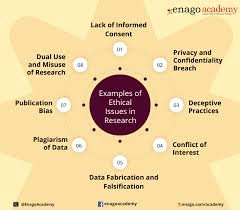Ethical issues in research include moral dilemmas and concerns. These arise when conducting research involving humans. Animals and sensitive data are also involved. These issues ensure that research is done responsibly, fairly, and transparently. They respect the rights, dignity, and well-being of participants. They also maintain the integrity of the research process.
In essence, ethical issues in research involve questions like:
- Are participants treated with respect and fairness?
- Is the research conducted honestly and transparently?
- Are the risks of the research justified by the potential benefits?
- Is the research conducted in a way that upholds societal values and avoids harm?
Researchers are expected to follow ethical principles and guidelines. These include informed consent, confidentiality, and fairness. Following these avoids misconduct and promotes trust in the research community. Ethical issues guarantee the research advances knowledge. They ensure high standards of integrity and social responsibility are maintained.
Ethical Issues Concerning Research Process
- Ignoring pertinent issues in research
Pertinent –appropriate to a particular situation i.e. relevant
- A researcher is expected to be honest in search of genuine problem and should be guided by academic freedom to discuss any findings
(b) Issues in experimental design
- In an experimental designs where control and treatment groups are used to provide meaningful comparison, differential between both groups is unfair and unethical
- Trust in a researcher is crucial. It is extremely unethical for the researcher to abuse their rights by using their power negatively, e.g., a researcher collects data to get somebody into trouble or to stigmatize them.
Ethical issues concerning research subjects

(a ) Confidentiality and privacy
Respondents should be protected by keeping information given confidential especially if confidentiality has been promised
(b) Anonymity
It refers to the identity of individuals being protected by using either numbers, third parties or pseudo names
Anonymity—the state of remaining unknown to most other people
Pseudo—not genuine, which is false or pretended
(c) Physical and psychological harm
- A researcher should never undertake a research that may cause physical or psychological harm.
- One should do all preliminary tests to obtain background information in effort to avoid harming situations
(d) Voluntary and informal Consent
- It is unethical if researcher fails to disclose the real purpose of the research fearing the subjects refusal to participate
- Subject must not be deceived as the to the purpose of research
(e) Misuse of vulnerable and or special population
It is extremely an ethical if disadvantaged populations in one way or another are used without their consent or guardians consent e.g. mentally handicapped, the sick, poor, street children etc.
(f)Financial issues and sponsored research
A sponsor of a research may demand some compromises on research quality in order to save money, time or demand distortion of the information for their reasons
(g) Dissemination of findings
It is unethical to cancel findings after completion of research
Ethical issues in research
- Ethics is a branch of philosophy dealing with ones conduct and serves as a guide to one’s behavior
- Researchers must be people of integrity who will not undertake research for personal gain or that which will have negative effects on others
(a) Plagiarism and fraud
- Plagiarism refers to where a researcher refers to another person’s work as theirs without acknowledging the author, in addition stealing ideas from another scholar
- Fraud refers to the situation where a researcher fakes data that has not actually been collected. It also refers to false presentation of research methodology and results
(b) Misuse of privileges
- If a researcher would like to see the effect of intervention by comparing the experimental group (which got treatment) and the control group (did not get treatment)
- One should resolve this dilemma by providing same treatment to the control group after the study
- If resources aren’t available, concluded explanation of the research to the control group may help reduced feeling of unfairness
(c) Use of test in research
Subjecting respondents to tests is unethical due to anxiety and discomfort experienced. It is responsibility of researcher to pick data collection method that is free of anxiety. If tests are a must, researcher should put the respondent at ease by reassuring them and providing relevant information.
Difference between literature review and background
Literature review expounds on a viable studies related to the area of study while background is a short summary briefly expounding on factors that have brought about the need for study and opportunities for improvement
Research objectives
Objectives are intentions or purposes stated in specific measurable terms. They provide opportunities for educating the end result. In research an objective is a specific statement related to the defined aim of the study. Objectives are operational i.e. they state specific tastes that will be carried out by the researcher to accomplish the aims of the study.
Related Topics
- Ethical issues in Research
- IMPORTANT TERMS IN EDUCATION RESEARCH
- Introduction to Social Psychology
- Importance of studying social Psychology
- History of social Psychology
- How to study effectively
- Psychology as a science
- Branches of psychology
- Research Methods in Psychology
- The concept of self


Leave a Reply